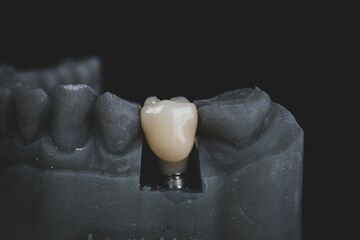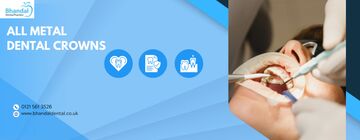
February 29, 2024
Types of Dental Crowns and Cost: A Complete Guide to 2024
Dental crowns are one of the most popular restorative treatments available in 2024. If you have a tooth that is severely damaged by trauma or decay, a dental crown will help to restore the strength of the tooth and could help you to avoid an extraction.
Crowns are also commonly used to improve the appearance of a tooth. For example, if you have chipped or cracked a tooth, or if you have discolouration that cannot be addressed with whitening, then a dental crown could help to restore the tooth aesthetically.
And finally, crowns are also commonly paired with dental implants to replace missing teeth, or as part of a larger bridge appliance.
There are many different uses for a crown, and there are many materials available to choose from. You could choose a single material crown, or a crown made from a combination of materials that help to provide additional benefits.
In this guide, we will explore the different types of crowns available in 2024 and how much you can expect to pay. We’ll also look at the difference between those available on the NHS versus those available through private dentistry.

What are crowns made of?
There are many different types of dental crowns available for different budgets and requirements. These are the main types of crowns you can expect to find:
All porcelain dental crowns
All porcelain dental crowns are typically made from porcelain or other ceramic materials. This is the most aesthetically pleasing dental crown restoration that looks the most like a natural tooth.
Porcelain offers a similar translucency to natural tooth enamel that helps it to blend in with surrounding teeth. This makes it ideal for crowns at the front of the mouth, however it is more brittle and susceptible to breakage, so it might not be the ideal choice for rear teeth.
These are the most expensive crowns available and will typically cost between £650 and £850 per tooth.

Porcelain bonded to metal crowns
For added strength, crowns can be constructed from metal and then have a porcelain cap added on top. Since the metal is darker and the porcelain is slightly translucent, this can result in a tooth that is darker than the surrounding natural teeth.
The darker appearance makes this an optimal solution for rear teeth that are less visible. The cost for a porcelain and metal bonded dental crown will typically be around £500 to £900 depending on the size of the tooth and the location.
Zirconia dental crowns
Zirconia is part of the titanium family, which makes it a popular choice for dental crowns thanks to its incredible strength and durability. Dentists often favour a zirconia crown over porcelain as it is less likely to chip or break. Zirconia also looks incredibly natural and can be colour matched to the surrounding teeth.
A zirconia crown will typically cost around £800-£1,100. While this is the most expensive option, it’s also the most durable and aesthetically pleasing option.

All metal dental crowns
If you are replacing a tooth at the back of your mouth and don’t mind the darkness of metal, you could choose an all metal crown. All metal crowns are typically made from gold, palladium, nickel or chromium.
Some people like the look of a metal tooth such as a gold tooth and will make the decision to have this in the front of their mouth. All metal dental crowns are the strongest and most durable. They won’t chip or crack and they rarely need to be replaced. This type of crown will typically cost around £250 to £600, depending on your choice of metal.
All resin crowns
Composite resin may be used on occasion to construct a dental crown in a cost-effective way. Rather than creating the crown in advance and fixing it to the tooth with adhesive, composite resin can be applied directly to the tooth and then shaped before it is hardened with UV light.
This is one of the most cost-effective crowns available, but it isn’t the strongest choice. Composite resin might be better suited for a tooth that doesn’t require much additional support, or for the front teeth that are visible when you smile.
Composite resin can be colour-matched to your surrounding teeth for a natural-looking finish. A composite resin dental crown will usually cost around £250 to £550, depending on the size of the tooth and location.

What type of crowns are available on the NHS?
If you choose NHS restorative dentistry, you will be limited in your choice of restorative materials. A crown provided on the NHS will only be available in medically-necessary situations. You might be offered a crown after a root canal procedure, or to help save a tooth severely damaged by trauma.
You will typically be offered a crown made from metal, porcelain fused to metal, ceramic or resin. Stainless steel crowns may be used as a temporary solution to protect a tooth before it can be repaired.
What types of crowns are available privately?
If you choose to go private, you will have a lot more treatment options available to you. You can typically choose any material for your dental crown, based on your personal preferences and the advice of your dentist.
If you are paying for your private dental care with dental insurance, you may be restricted in your choice of materials by your insurance coverage. However, you may be able to pay the excess to ensure you get the dental crown restoration that you want.

What is the cheapest type of crown?
The cheapest type of dental crown is a composite resin crown. The lower cost means that you can also expect a shorter life expectancy from your crown. Composite resin is also used for dental fillings, so it is very strong and durable, but it is usually only used to fill the lower ridges of the tooth rather than the cusp. When choosing materials that need to withstand the force of your bite, it’s common to pick a more durable crown material.
That said, composite resin is highly cost-effective and offers a quick restoration. If your restoration is more aesthetic than functional, then you may be happy with a composite resin crown. This treatment can be completed in one visit and will wear down gradually over time, rather than chipping, cracking or breaking off.
What is the most aesthetically pleasing dental crown?
Porcelain and zirconia offer the most aesthetically pleasing restoration choices that will look the most like a natural tooth. This is because these two materials mimic the colour, texture and slight translucency of a natural tooth. Porcelain and zirconia crowns can be colour-matched to your surrounding teeth, or they can be selected in a slightly whiter shade to help improve your smile.
For rear teeth, the most aesthetically pleasing and durable choice will be porcelain bonded to metal crowns. While there is a thin metal line visible at the gum line, this won’t be obvious on rear teeth. The slightly darker shade of the tooth is also less visible, but you will enjoy a far more durable dental restoration.

How do I choose the right dental crown for me?
The first step to choosing the right dental crown material is to consult with your dentist. You need to consider a wide range of factors before making a final choice, and you may be restricted in your choice by practical considerations.
First and foremost, you need to consider the durability of the restoration. For rear teeth, you will likely need to select a material stronger than porcelain. A metal bonded crown could be ideal, but you may also be able to get away with choosing a zirconia dental crown.
If you grind your teeth at night, think carefully about your choice of restoration. Your dentist is likely to recommend a metal dental crown paired with a mouth guard to protect your teeth from further damage.
Aesthetics also play an important role in your choice of dental crown material. The most sympathetic restoration will involve materials like porcelain or zirconia. Composite resin can also achieve visually appealing results on a budget. If you aren’t bothered about appearance, then a metal crown offers the highest strength for the lowest price.
And finally, your budget may play a role in your choice of materials. When money is no object, a zirconia restoration offers incredible durability and aesthetics, but this comes with one of the highest price points. Composite bonding is the cheapest option, but this has its limitations.
Closing thoughts
There are clearly many factors to consider when choosing the right dental crown materials for your needs. In 2024, there are many different materials available with pros and cons to consider. Before making a final choice, get the advice of a dental professional. Remember that many dental crowns will need to be replaced or repaired after 10-15 years, so you should also factor in the lifetime cost of the restoration, as you may need to pay for this more than once.
Join the practice
We offer excellent care and advice regarding our wide range of treatments to all of our patients.
Contact our main practice
0121 561 3526Find your nearest practice
Related articles
You may also be interested in
